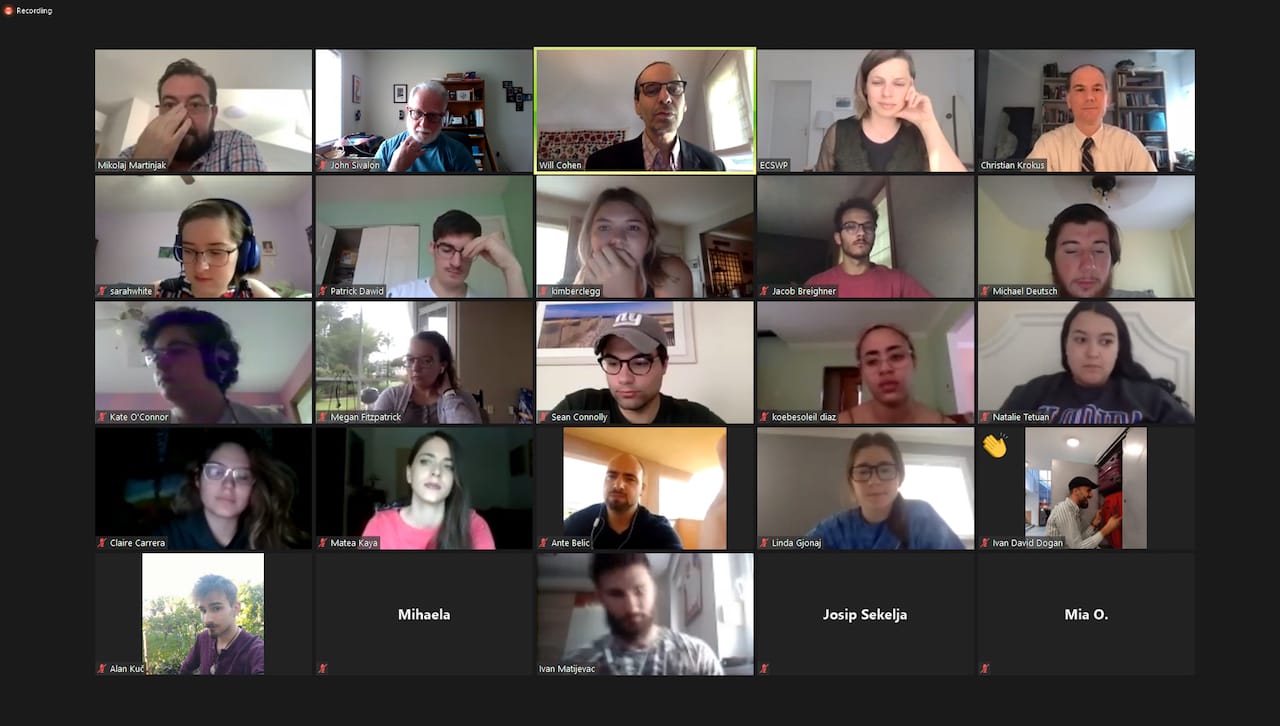Virtual Travel Class Includes International Dialog

University of Scranton theology and religious studies professors Christian Krokus, Ph.D., and Will Cohen, Ph.D., had planned a travel course for over a year. With the aid of a University provost grant they made a preparatory trip to meet with Fr. Mikolaj Martinjak, S.J., from the Jesuit Faculty of Philosophy and Religious Studies of the University of Zagreb. With him and through their own contacts, they developed an exciting itinerary and syllabus on “Religious Diversity, Conflict, and Reconciliation in Southeast Europe.” The course was a spring semester course with a travel component whose itinerary included travel to Serbia, Croatia and Bosnia. Just as they were finalizing plans for a May 21 departure, the Covid-19 pandemic caused the cancellation of all study abroad trips.
Drs. Krokus and Cohen, known for their flexibility and creativity, quickly adjusted the course to include a virtual travel component. Using Zoom they brought together 12 students from The University of Scranton and nine students from the University of Zagreb. In addition to Fr. Martinjak, who spoke on the history of the Jesuits in Southeast Europe, guest speakers from Serbia, Bosnia and Croatia included: Boris Erg, who discussed the Jewish experience in Serbia; Nermin Botonjić, who discussed Islam in Croatia; Dr. Petra Belković Taylor, who discussed conflict through the lens of literature; and others. Students from both schools participated actively in the discussions after presentations by both professors and guest speakers. Those discussions were also carried on virtually through posts on the course’s discussion board with each Scranton student having a Zagreb discussion partner.
Amra Pandžo, a self-identified feminist Muslim and director of a NGO dedicated to peace and reconciliation in Sarajevo said, “in war, all the systems that you have depended upon to live and survive, stop. What is left is your inner self which they cannot take away from you and that is what you need to develop. Who are you and what kind of person do you want to be? How should we treat each other?”
Alen Kristić with Fr. Ivan Nujić, OFM from Bosnia and Jelena Jorgačević Kisić with Prof. Andrej Jeftić from Serbia helped the participants to understand the depth of atrocities that happened in the civil war of the 1990s and the failure of people and faith leaders to admit their complicity in those atrocities. As Jorgačević Kisić explained, one of the ways that complicity is rationalized is through competing narratives of victimization. Each of the ethnic groups magnify their own suffering while dismissing or diminishing the other’s suffering. And one student participant from Zagreb added, “there can be no reconciliation without truth and nobody wants to know the truth.”
The University of Scranton students came to understand that these topics are not just academic issues but that they are very real and intense experiences for their Zagreb counterparts. As Ivan Matijevać from Zagreb wrote, “the discussion board for the students has been a great help for students to exchange different types of experiences. … We as students from this area can facilitate the Scranton students coming to really appreciate these topics because we are de facto, living them. And they help us understand how others outside of our area are looking at Southeastern Europe.”
Scranton student Kate O’Connor ’22 supported Matijevać’s position. She wrote, “although, of course, it’s not the same as being there, Drs. Cohen and Krokus have gone above and beyond when it comes to providing a substitute for our cancelled trip. The online discussion board we’ve been using has been a great way to interact with the students from the University of Zagreb outside of class. I believe that hearing their perspectives both in and outside of class is an integral part of this course, and I'm glad we can still get that aspect of it despite the long-distance restriction.”
Drs. Cohen and Krokus even managed to incorporate a service component virtually. Jelena Djurdjević described her work in the “Pedro Arrupe Integration House” in Belgrade, Serbia. This Jesuit Refugee Service home ministers to unaccompanied refugee minors. The present residents range in age from nine to 18 years old. Most of them are from Syria and Afghanistan. This house itself is an exciting microcosm of the very topic of the course. It is supported by the Roman Catholic Jesuit Refugee Service, staffed by primarily Serbian Orthodox and with residents who are almost exclusively Muslims.






